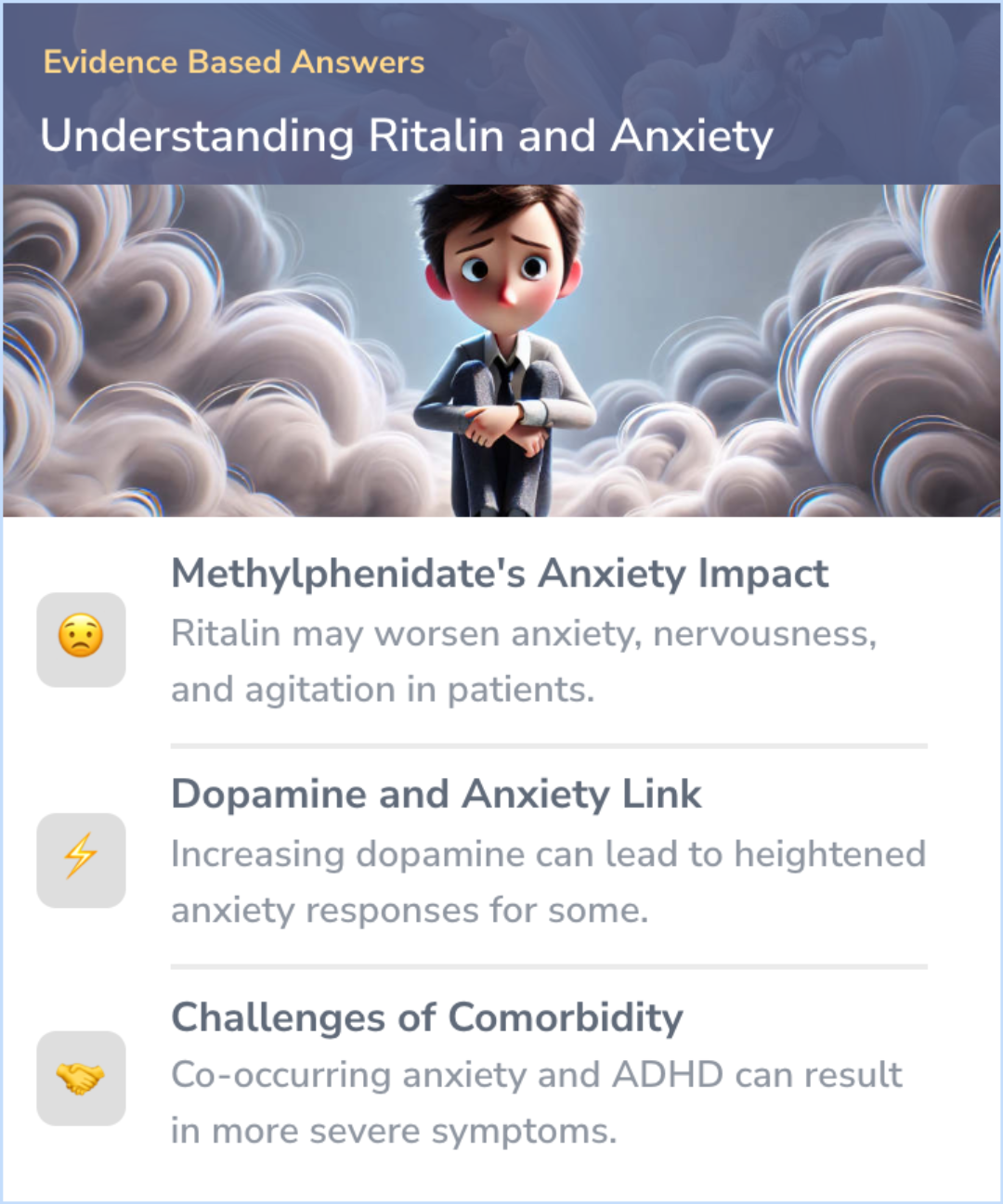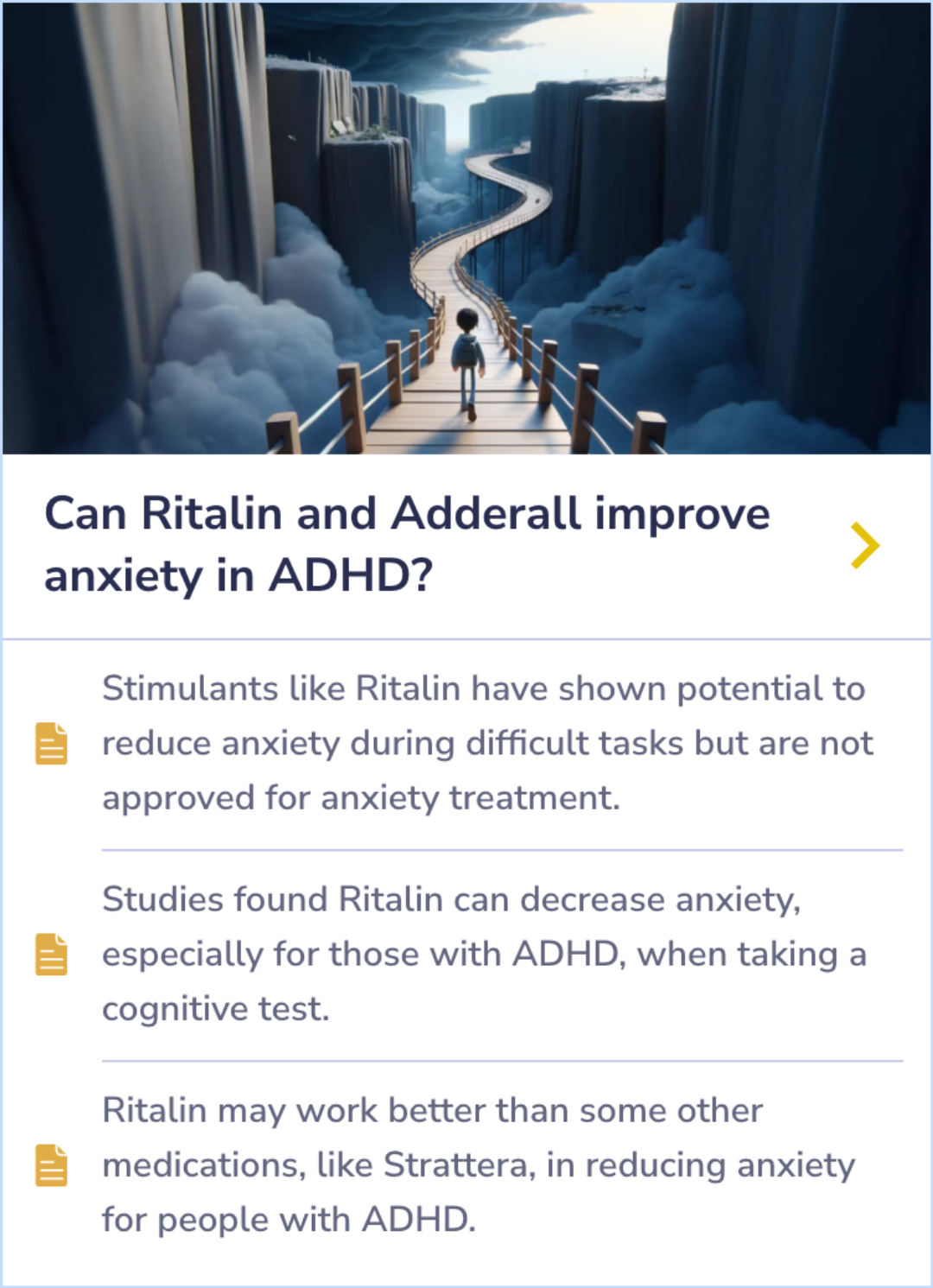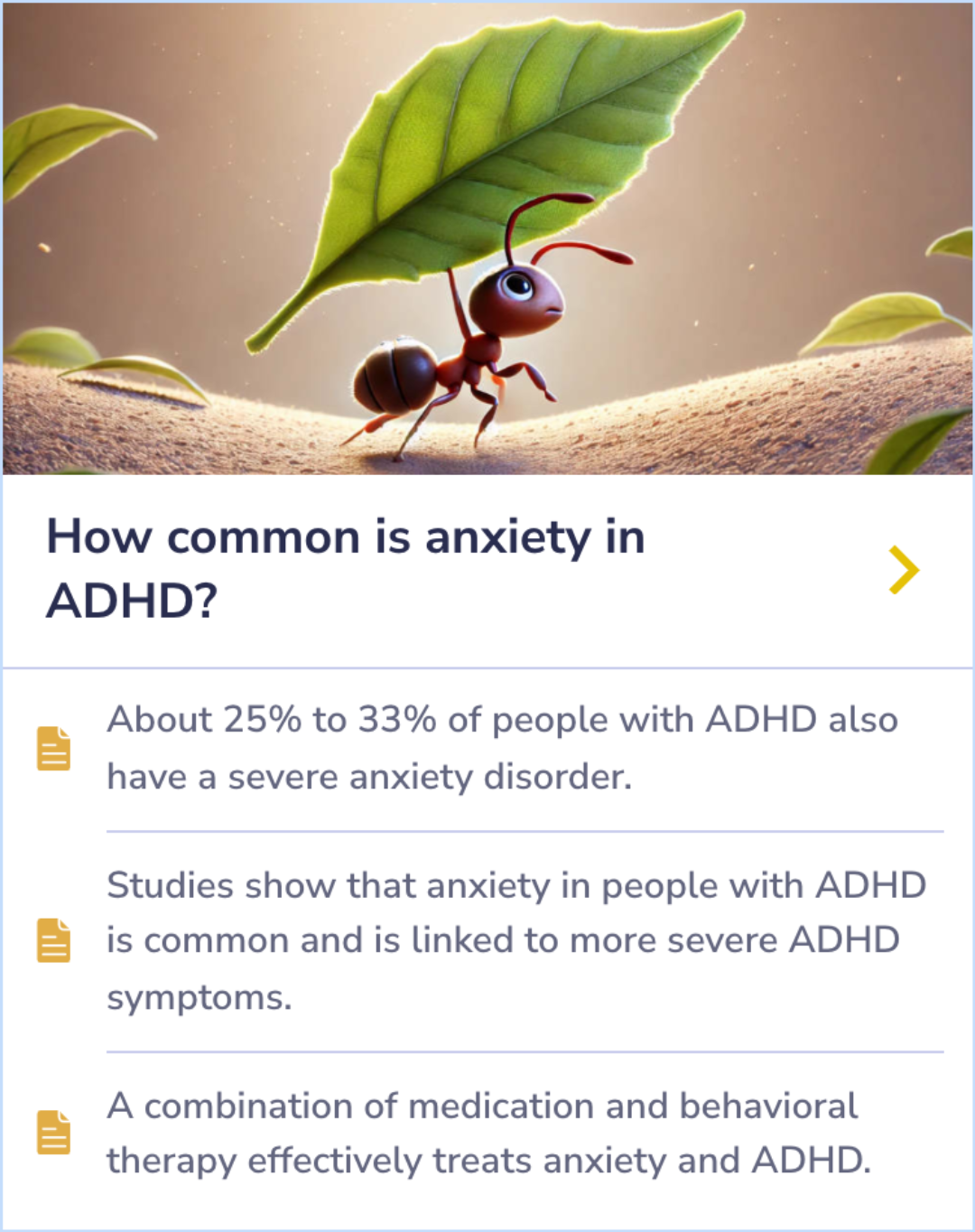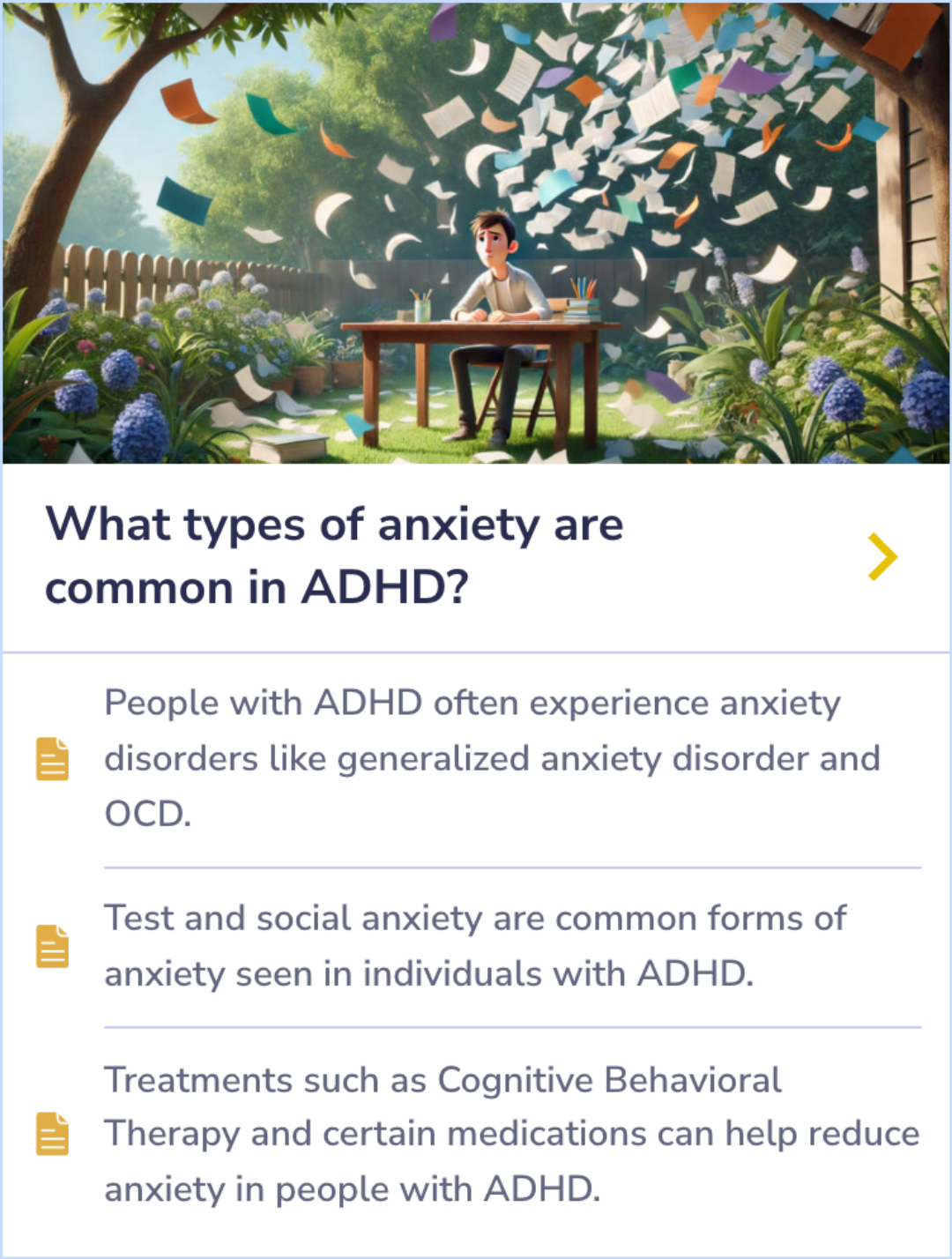Ritalin
Evidence Based Answers
Why does Ritalin make anxiety worse?
Ritalin's effects can include increased anxiety and agitation, especially in those with pre-existing conditions. The medication raises dopamine levels, potentially amplifying anxiety. Co-occurring ADHD and anxiety complicates treatment approaches.
Published: November 7, 2024
Click to explore a section:

Ritalin can worsen anxiety symptoms, increase dopamine, and complicate treatment for individuals with ADHD and anxiety.
Background: Potential Behavioral Effects
Ritalin has been linked to new or worsening behavioral and thought problems such as heightened aggression or hostility, and symptoms associated with bipolar disorder. These symptoms may manifest in both children and individuals without a prior history.
Additionally, it is advised to inform a doctor if new psychotic symptoms, like hallucinations or delusions, or manic symptoms arise. This highlights Ritalin's potential to exacerbate existing mental health conditions or trigger new symptoms in susceptible individuals.
Additionally, it is advised to inform a doctor if new psychotic symptoms, like hallucinations or delusions, or manic symptoms arise. This highlights Ritalin's potential to exacerbate existing mental health conditions or trigger new symptoms in susceptible individuals.
Methylphenidate and Anxiety Symptoms
Methylphenidate (Ritalin) can impact anxiety, especially for those with pre-existing anxiety. While it helps manage ADHD, it may also worsen symptoms such as nervousness and agitation.
Insomnia and nervousness are frequently reported side effects of methylphenidate. For individuals with marked anxiety, the medication can exacerbate symptoms, so it is not recommended for such patients.
Insomnia and nervousness are frequently reported side effects of methylphenidate. For individuals with marked anxiety, the medication can exacerbate symptoms, so it is not recommended for such patients.
“
Source Quotes:
Insomnia and nervousness are the most commonly reported adverse effects in patients using methylphenidate.
Marked anxiety, tension, and agitation are contraindications to Ritalin, since the drug may aggravate these symptoms.
Dopamine Levels and Anxiety Effects
Methylphenidate raises dopamine levels, which can improve focus but may also heighten anxiety. This effect is more likely if dopamine levels rise too quickly.
The impact of methylphenidate can depend on dose, as higher doses may cause faster and more intense dopamine increases, potentially leading to anxiety.
The impact of methylphenidate can depend on dose, as higher doses may cause faster and more intense dopamine increases, potentially leading to anxiety.
“
Source Quotes:
We hypothesize that under certain circumstances methylphenidate overactivates the dopamine system, making the experience of the drug itself 'very salient.'
The time at which serum concentration would cross any threshold value is related to dose, with higher doses exceeding thresholds faster than lower doses.
Anxiety and ADHD: Treatment Challenges
Managing both anxiety and ADHD together can be challenging. People with both conditions often experience more severe symptoms and poorer outcomes.
Anxiety disorders are common among patients with co-occurring conditions, affecting over half of such individuals.
Anxiety disorders are common among patients with co-occurring conditions, affecting over half of such individuals.
“
Source Quotes:
Individuals affected by both anxiety and depressive disorders concurrently have generally shown greater levels of functional impairment, reduced quality of life, and poorer treatment outcomes compared with individuals with only one disorder.
Anxiety disorders were the most common category of disorders, with a prevalence of 54.3 percent among patients with a co-occurring disorder.
Key Takeaways
Conclusions
Ritalin, while effective for ADHD, can worsen anxiety due to its action on dopamine levels. This drug increases alertness but can heighten feelings of anxiety, especially in those with existing anxiety disorders. Clinical findings highlight that insomnia and nervousness are common, reinforcing cautious prescription and monitoring.
The dual impact on dopamine not only aids attention but can also trigger anxiety responses. In patients with both ADHD and anxiety, the overlapping symptoms pose a treatment challenge. High prevalence necessitates a tailored approach for effective management.
The dual impact on dopamine not only aids attention but can also trigger anxiety responses. In patients with both ADHD and anxiety, the overlapping symptoms pose a treatment challenge. High prevalence necessitates a tailored approach for effective management.

Evidence Summary
Ritalin's Potential Impact on Anxiety in ADHD
Ritalin, commonly used for ADHD, may help reduce anxiety symptoms during challenging tasks, even though it is not officially approved for anxiety treatment. Research highlights its ability to lower anxiety levels in individuals with ADHD when taking cognitive tests.
Some studies suggest Ritalin could be more effective than Strattera for managing anxiety symptoms in ADHD cases. While stimulants like Ritalin show potential benefits, they are not specifically approved for anxiety relief.
Some studies suggest Ritalin could be more effective than Strattera for managing anxiety symptoms in ADHD cases. While stimulants like Ritalin show potential benefits, they are not specifically approved for anxiety relief.
Evidence Summary
Managing ADHD and Anxiety Comorbidity
A significant number of individuals with ADHD also experience severe anxiety disorders, with estimates ranging from 25% to 33%. Anxiety tends to heighten the severity of ADHD symptoms, complicating management.
Combining medication and behavioral therapy has proven effective for treating both conditions, offering a dual approach that addresses symptoms from multiple angles. This approach underscores how interconnected anxiety and ADHD can be in clinical treatment.
Combining medication and behavioral therapy has proven effective for treating both conditions, offering a dual approach that addresses symptoms from multiple angles. This approach underscores how interconnected anxiety and ADHD can be in clinical treatment.
Evidence Summary
Managing Anxiety in ADHD: Treatment Approaches
Anxiety frequently accompanies ADHD, often manifesting as generalized anxiety disorder, OCD, and social anxiety. Treatments such as Behavioral Therapy and medications like Strattera can effectively reduce symptoms and improve patient outcomes.
Those with ADHD may experience specific anxiety triggers, including social situations and test-taking. Managing these symptoms often involves Cognitive Behavioral Therapy and tailored medication strategies.
Therapies focused on anxiety relief can offer support to those managing both ADHD and anxiety, providing a multi-faceted approach.
Those with ADHD may experience specific anxiety triggers, including social situations and test-taking. Managing these symptoms often involves Cognitive Behavioral Therapy and tailored medication strategies.
Therapies focused on anxiety relief can offer support to those managing both ADHD and anxiety, providing a multi-faceted approach.


